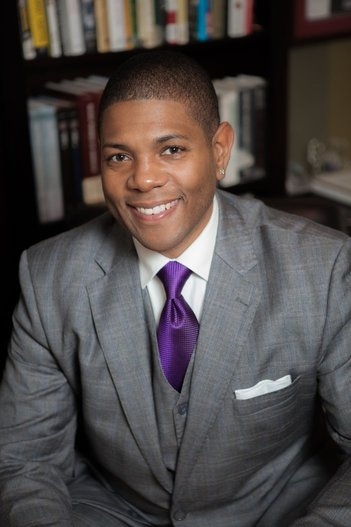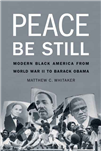You have /5 articles left.
Sign up for a free account or log in.

Matthew Whitaker
Arizona State
When an anonymous blog last year accused Matthew C. Whitaker of plagiarizing portions of Peace Be Still: Modern Black America from World War II to Barack Obama, he said that he wouldn't respond to charges presented in that way. His publisher, the University of Nebraska Press, backed him.
 The anonymous nature of the charges bothered some at Arizona State University, where Whitaker was a full professor and led a research center. But after the university conducted an investigation and found misconduct, Whitaker now says that he agrees that he made significant mistakes in the book.
The anonymous nature of the charges bothered some at Arizona State University, where Whitaker was a full professor and led a research center. But after the university conducted an investigation and found misconduct, Whitaker now says that he agrees that he made significant mistakes in the book.
Mark S. Searle, Arizona State's interim provost, last week sent an email message to history faculty members in which he said an investigation into the book had "identified significant issues with the content of the aforementioned book." Searle went on to say that "as a result of the outcomes from that investigation, Dr. Whitaker has accepted a position as associate professor without a Foundation Professorship [an honor he previously held], and now co-directs his center."
Searle also forwarded a letter from Whitaker, in which he admitted wrongdoing. Both letters were forwarded by someone other than the authors to Inside Higher Ed.
"I have struggled to overlook the personal nature of the criticisms, and to evaluate and recognize that there was merit to some of them. I alerted ASU administration to the fact that the text contained unattributed and poorly paraphrased material. I accept responsibility for these errors and I am working with my publisher to make the appropriate corrections," he wrote.
"Peace Be Still deals with history that is dear to me -- told and read to me since childhood. I did not purport to write original history and I drew upon many established sources. I did intend to give full credit to all sources. But my critics have revealed numerous mistakes that I made. It is painful to recognize that I was so careless as to fail to properly paraphrase and cite sources, despite my reverence and respect for the work of others in this field," he wrote.
The word "plagiarism" does not appear in Searle's email or Whitaker's letter. But it appears in documents about Arizona State's investigation, which the university provided upon request to Inside Higher Ed.
A letter from Karin Ellison, associate director of the Center for Biology and Society at the university, who was among those tasked with investigating the allegations, wrote that she was bothered that many of them surfaced in an anonymous blog. "I am saddened [by] the lack of professional conduct in the way the allegation has been made," she wrote, noting that the blogger could have complained directly to the university or to the publisher. She said that the blog's content "suggests personal animosity more than concern for the standards of scholarship."
That said, she also found hat the allegations had merit. "I am also disappointed to find features that may be plagiarism by Dr. Whitaker in Peace Be Still." She said the anonymous blogger was correct about "identical phrases occurring both in Whitaker's text and other sources."
The blog in question may be found here, and an Inside Higher Ed article with examples of phrasing similarities may be found here.
Ellison's letter led the university to commission an additional inquiry by Keith Wailoo, a historian at Princeton University, who also noted his discomfort with taking anonymous, hostile comments seriously in this way. Wailoo noted that not all of the accusations may be clear-cut plagiarism, but that by the time he was doing his review, Whitaker had identified problems that he had presented to the publisher (beyond the problems that had been identified).
Wailoo quoted from American Historical Association standards that say that "a persistent pattern of deception may justify public disclosure or even termination of a career" but that "some scattered misappropriations may warrant a formal reprimand." In Whitaker's case, Wailoo said, "the examples of unattributed borrowing from other sources fall in the zone between 'scattered misappropriations' and 'a persistent pattern.'"
Donna A. Shear, director of the University of Nebraska Press, said the book is currently out of stock, and so any future copies will have appropriate corrections. Asked if the new version would note what has happened, she said via email: "I cannot see why there would be a need for a notice in the corrected version."
Part of the concern about Whitaker's case for some of his faculty colleagues came from the way Arizona State responded to accusations against him in 2011. In that case, the accusations were not anonymous and came from faculty members who objected to Whitaker's promotion to full professor. They said that he had lifted passages from other books, Wikipedia and a Washington Post article and used them in material he published and in a 2010 speech about Arizona’s immigration law.
The university appointed a three-member committee, which concluded that there was no "substantial or systematic plagiarism" by Whitaker, but said that he had been careless about attribution in some cases. As a result, the committee did not recommend any institutional actions. This outcome angered some faculty members, who said they were astounded by the decision. Monica Green, a professor in the department, resigned from her post as the chair of a committee on tenure in protest after the results of the investigation were announced.
In response to a question from Inside Higher Ed on Friday, Whitaker said via email that he didn't have anything to add to the letter of apology that was sent to his department, but that he hoped people would read the full reports on the accusations. "I will move forward and work harder to ensure that my intellectual debts are paid," he said.




